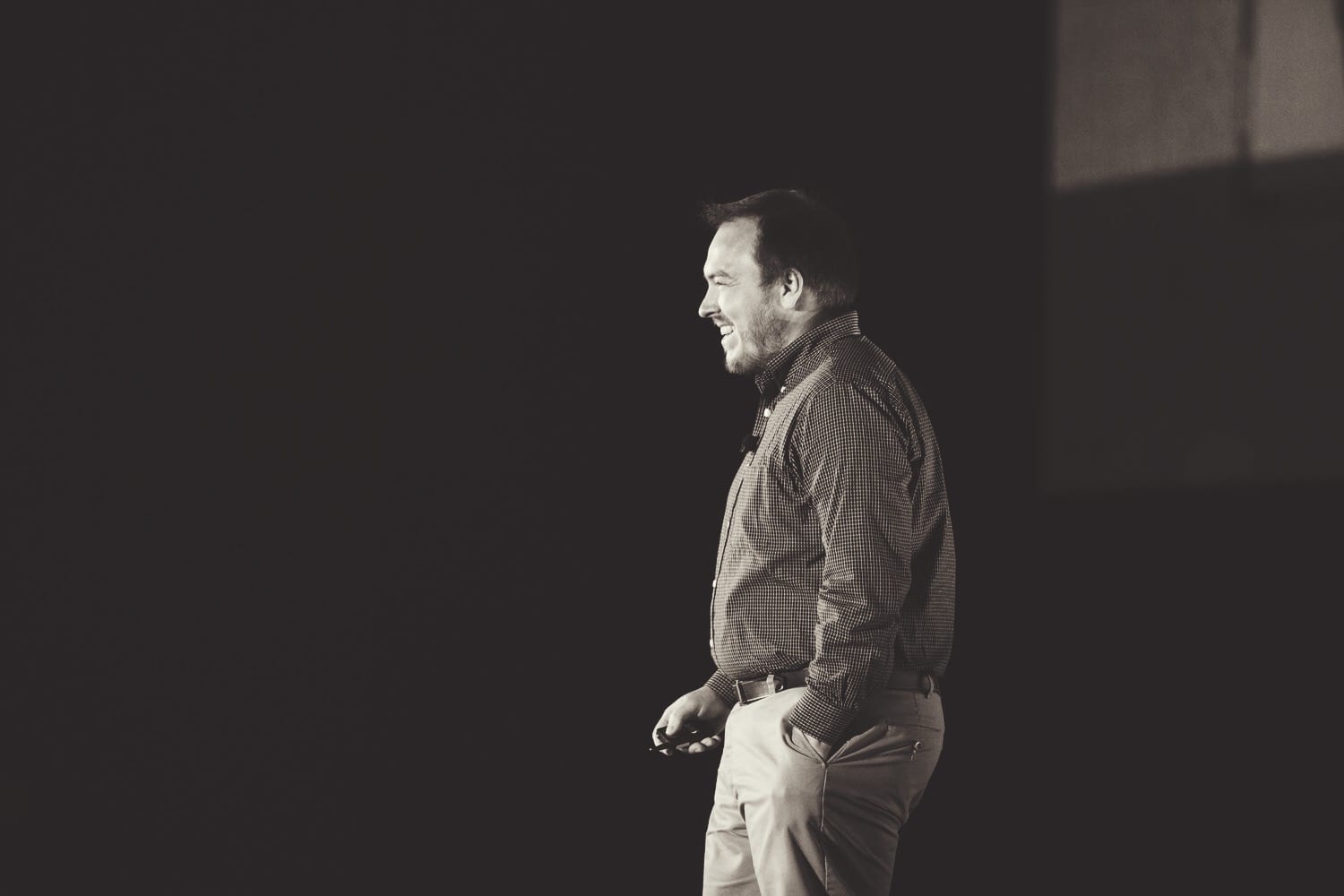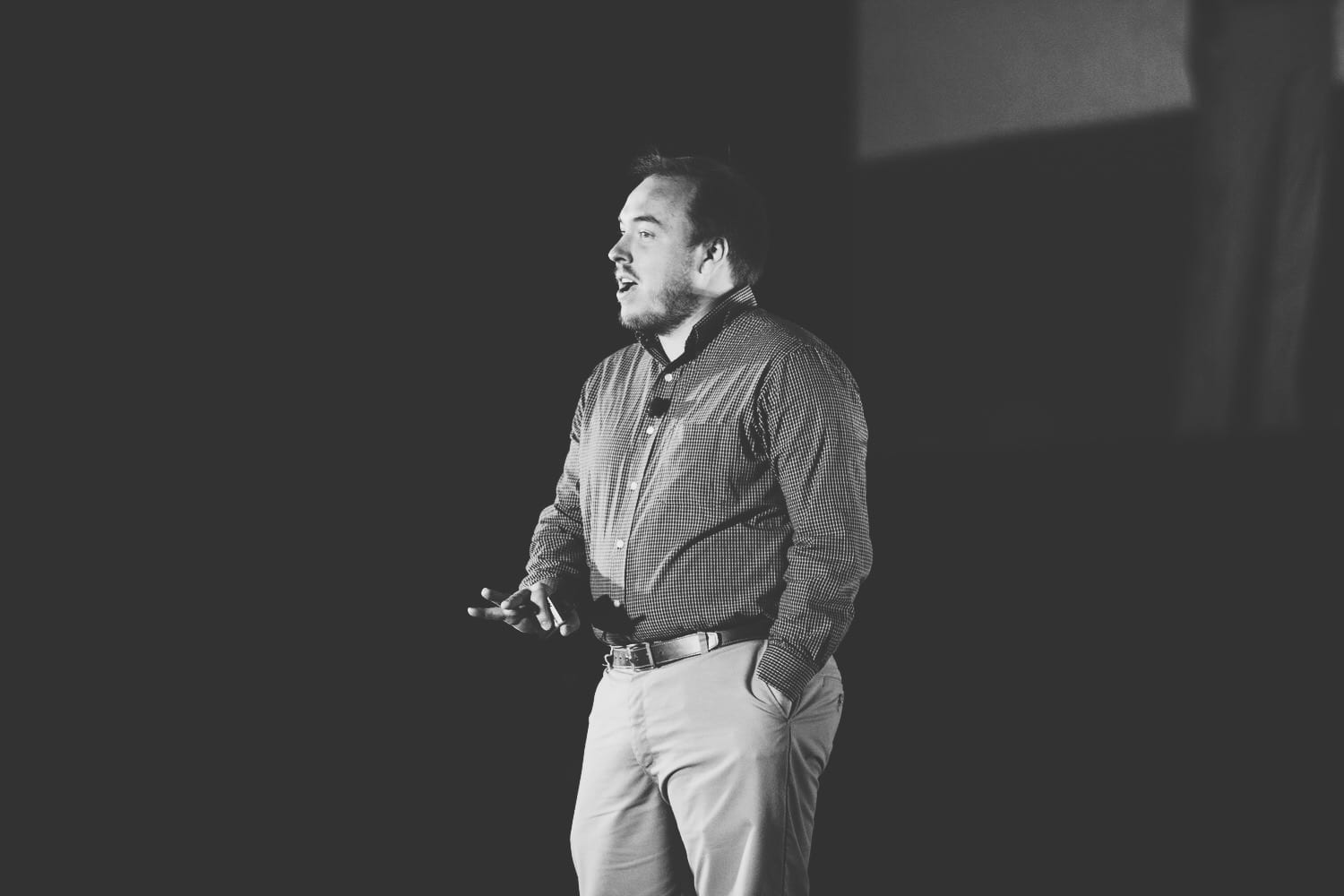The evening began and ended with tasteless jokes – the kind of tasteless jokes I don’t usually put in print. In addition to Micah, Caleb, and Bryan, there were several other mutual friends who came just to listen (and talk a lot of crap). I could tell I was among good friends. But even as close as many in the room were, we would come to find that we still had a lot to learn about Garrett. Personally, I was amazed at the level of insight and profundity in this interview; sandwiched between the middle schooler jokes was some incredibly challenging and thoughtful dialogue.
Finally, Garrett tells us that he actually knew he wanted to be a high school English teacher when he was in 4th grade.
“I knew I wanted to teach English, even at that early age, because I felt like English gave me a voice, versus math, where there’s just one set answer.”
I asked, “So why did you decide high school English, specifically, in the 4th grade?”
“I think at the time,” said Garrett, “I was probably fed up with 4th graders and I had not heard good things about middle school, because the middle school I was going to go to before I moved was called “JFK” except everybody called it “Jail For Kids” so I was super nervous about it. We used to do indoor soccer there and it looked like a prison.”
Caleb asked Garrett about how his view of positive classroom culture had been influenced by teachers in his life.
“I had a teacher in high school who was also my first observation when I came back from college. There were two kids sitting in the back, and I remember they were not wanting to do the work that they were doing, but they were doing it anyway. And they were like, ‘You know, I hate English, I hate English class, and I don’t want to do this; but, I respect Mr. Showman so much that I’m gonna do it. I don’t want to disappoint him, and I want to exceed the expectations for us’. So both of those things were eye-opening for me, that it wasn’t about the way that he was teaching, it was about the relationship that he had built with them. Like, ‘Even though English is not my strongest subject, the relationship I’ve built with him makes me want to grow in it’. That was really profound.
“Positive classroom culture is huge, and I think that drives most of the decisions that I make in the classroom. Something that we do at the beginning of the week, or sometimes multiple times a week, is we’ll make a circle and rate ourselves between 1 and 5 on how ready we are to learn that day, or how ready we are to be at school.
“From a teacher’s standpoint, I think what that does is allow me to assess where everyone is at for the day, and who’s gonna need some extra guidance, or who might be turned off to what we’re doing. So that’s really awesome. And that’s such a small thing, but it can have such a huge impact on the next 90 minutes of class.
“And from a student’s standpoint, at the beginning they have the option of explaining why they’re rating themselves where they’re at. So if they’re a 1, they don’t necessarily have to explain why. But what I’ve come to find is that as we’ve done this more, they’ve really started to open up to one another, and to open up to me, and I think that they feel like it’s a safe place now, to confide in a group of people who are just gonna support them and not take those things outside of that circle.
“And then after we rate ourselves, they’ll draw from a bucket of topics that they chose at the beginning of the semester. The topics are meant to be things they don’t necessarily get a chance to talk about in school. For example, we talked about how to respond to one of their peers passing away, because they’ve had that happen before and they weren’t really sure how to approach that in school. And I think those conversations are huge, and they don’t get to have them anywhere else, because often, I think in schools the way that you grieve is prescribed – it’s very top down, like ‘Hey, here’s how we’re gonna address this and basically we’re not gonna talk about it.’ When really, if you have that positive classroom culture, it’s not an issue that you are engaging in discussions like that. And I think the students really crave the inquiry that comes from it.
“Vulnerability is huge. I did some research on vulnerability, and I differentiate between the effect of positive vulnerability on a classroom, and negative vulnerability. Positive vulnerability would be students being comfortable to share things as a person, and as a student, and not feeling like they’re stifled or silenced at any point; it’s about students still having that point where they’re like, ‘I think I know the answer to this question…’ and then going through that self-doubt that we all go through before we answer a question, but knowing that they can raise their hand, and whether they’re right or wrong, their participation and their willingness to engage in the conversation is valued and respected.
“Whereas negative vulnerability – which I think happens much too often – is being aggressive about the way you manage a classroom, where you almost force students not to engage with your questions, your assignments, or with you as a teacher. And that prohibits the relationship entirely, and then the teacher wonders why they’re having so many issues in the classrooms. It also fosters the terrible side of teacher-centeredness versus student-centeredness. So teacher-centeredness would be, ‘Listen to what I have to say’ whereas student-centeredness is students listening to each other, and what they have to say. Rather than looking to the teacher for answers, they learn to look at themselves and their peers for answers.
“I think a lot of teachers are drawn to teacher-centeredness because it keeps the class sort of silent and attentive. But it stifles really meaningful conversation, and it becomes one-sided and then I don’t feel like students are learning in environments like that. They’re just being talked at.”
“I remember once during my student teaching, I was on the phone with a friend of mine and I was like, ‘You know I had this epiphany today, and it was that not every second has to be fun.’ And he was like, ‘Well why not?’ and in one day I had the epiphany that not everything has to be fun, but I also had the epiphany that everything can be made fun. And now I think I’m transitioning into ‘It has to be fun’, and that’s worthwhile, for both the student and the teacher. So a lot of the lesson planning I’ll do says, “Here is the standard, and here is my initial thought on how we can approach this, and then how can we make this meaningful and relevant for the students, versus meaningful and relevant for me…I read this quote the other day that was asking if you would trust an airplane pilot who had only done worksheets. And that’s so true, because a bunch of worksheets are just not meaningful. And if you can provide meaningful, interesting experiences for the kids, then, if that takes more work, so be it.”
I ask, “What makes that work worth it for you?”
“Positivity,” he says. “It’s really incredible how much positivity you have the power to project. So I stand by the door every day to greet the students, and the first hour, they’re just not having it. It’s 7:30 – they’re not happy to be there. And so what I’ll do is this: when ‘Jane Doe’ walks through the hallway doors, I’m the first one there, holding the door open. As soon as Jane Doe opens the door I’m like, ‘GOOD MORNING JANE DOE!!!’ And then suddenly it gets harder because the minute bell rings, and then they’re all coming in at once and I have to be like, ‘Hey! Micah Dailey! Yeah! Caleb Dailey!’ and then it gets super fast and they’re just like, ‘Oh my gosh, my friends are here with me and this is so embarrassing’, and they can’t handle it. But then, as they walk in the door, I just say something simple like ‘Hey it’s so good to see you today’, or ‘I’m really glad to have you in class’. Or it’ll be something totally random just to throw them off like, ‘Lots to do, very little time!’
“And with a lot of the kids, it’s like, thank you for noticing me. Because maybe I just came out of a class where the teacher didn’t notice me…I’m sorry I’m getting a little emotional here…but that’s incredible to me. And it changes the tone for the whole class, because then I’ll walk in and they’re excited to be there. And all I really had to do was say their name…loudly.”
Caleb points out that by embarrassing them, he also embarrasses himself, and in a sense displays the vulnerability and boldness he wants his students to have. We discuss how even simple acts like embarrassing yourself in the hallway can show students that you care for them and are invested in their lives.
“I think that the one thing that I want to leave them with – and I probably tell them this every day at some point in class – is that I love my job. Because I do – so, so much – and at the end of the day, they know that I know this is the best job in the world, and I think that’s what keeps the relationships intact, and teaching intact, and everything that we built together in that classroom, together.”
Micah asks Garrett what community involvement looks like with public schools, and what he wishes it would look like. He talks about the fact that often, the reason why members of any community are not engaged or invested is that they don’t feel a sense of belonging – parents are often hesitant even to come to a high school because they themselves had such negative experiences when they were in high school.
“Similarities are not what makes somebody belong. Belonging is not sameness – it’s the affirmation of difference.”
“I remember I wrote a paper for a conference, and there was a book by John Dewey, who’s an education researcher. He posed the question: how full and free is the interplay between your community and the other forms of association? So like, how accessible is your form of association with others? How easy is it for people who may not associate with you to enter your community? Do you affirm difference in that community or do you sort of close those entry points and make it exclusive, where only the people in the community feel like they belong? That is the goal, I think, of schools. Because once you have belonging, wherever that is in school (and hopefully it’s in multiple things) that’s when they not only feel belonging, but take ownership, of what you do there and what others do there. And when the school does something to connect with community, you’re able to understand your stake in that a little more and really, not only feel belonging at school, but also in the community, which I think results in people wanting to serve their community more than themselves.”
The kind of involvement, says Garrett, that teachers crave more than anything is the opportunity for their students to have what he calls an authentic audience in the community, involving the skills and knowledge of people in that community. For instance, if students are asked to design a treehouse reflecting a character from a book, the teacher could have an actual architect come in to evaluate how practical their designs are in real life. Or, if they were learning about how legal battles function, to have an actual judge or lawyer evaluate their arguments. Partnerships between schools and community members with all kinds of skills and experiences will enhance a student’s sense of connection with his or her community, and sense of meaning and importance in learning.
I left this interview deeply moved, and challenged. In a sense, we are all artists in our own rights. The way Garrett Maier approaches his occupation as a teacher has a great sense of artistry to it – he shapes and molds classroom culture, and creatively frames his subject matters for learning in ways that appeal to his students’ sense of meaning, belonging, and fun. Do I approach my own work with the same level of integrity and love for those I impact, whether in my direct contact with them, or through the products and services they receive from me? Do I even approach my own art with that kind of passion?
No matter what we do, we can project positivity, display love, and live with integrity. And, no matter what we do, our work will leave its own creative mark on the world we live in.


